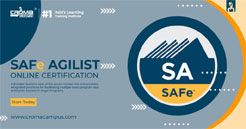Agile Tools For Software Development
4.8 out of 5 based on 3225 votesLast updated on 20th Feb 2023 5.4K Views
- Bookmark

There are many agile tools available for software development. It can help teams to manage their projects and collaborate more comfortably.

Agile is a project management methodology that emphasizes flexibility, collaboration, and continuous improvement. It was originally developed for software development, but it can be applied to many other types of projects as well.
Key Principles of Agile
Agile is based on the idea that requirements and solutions evolve through the collaborative effort of self-organizing and cross-functional teams. Agile values individuals and interactions over processes and tools, working software over comprehensive documentation. To further now about its principles, one can visit Agile Online Training. Given below are some of the key principles of agile include:
- Iterative and incremental development: Agile projects are divided into short iterations, typically lasting one to four weeks, during which the team produces a working product increment.
- Continuous feedback: The team constantly seeks feedback from customers and stakeholders, which is used to improve the product and the development process.
- Adaptability: Agile teams embrace change and respond to it quickly, adjusting their plans and priorities as needed.
- Cross-functional teams: Agile teams are typically composed of members with diverse skills and backgrounds, who work closely together to achieve the project goals.
- Transparency: Agile projects are transparent, with all team members and stakeholders having access to the same information about the project's progress and status.
- Overall, the agile methodology is designed to help teams be more responsive to changing circumstances, produce high-quality products, and work more efficiently and collaboratively.
Note: The CSM Online Certification equips professionals with essential Scrum knowledge, empowering them to effectively lead Agile teams, enhance collaboration, and deliver value-driven projects in dynamic, fast-paced environments.
Also Read This:
What is Scrum and its Modules?
Need of Certified Scrum Master
Scrum Master Course Syllabus For Beginners
What are the Benefits of Using Agile?
Using Agile helps in increasing flexibility and it permits changes and adjustments to be made to the project scope and timeline throughout the development process. This results in helping teams to better respond to changing circumstances and requirements. In addition, it enhances collaboration and emphasizes teamwork and communication, which leads to better collaboration and more efficient and effective problem-solving. Agile is a highly effective methodology for managing complex projects, particularly those in which requirements are likely to change over time or where there is a need for frequent collaboration and feedback. Below are some of the significant benefits of using Agile.
- Faster time to market: Agile's iterative approach means that working product increments can be delivered more quickly than with traditional project management methodologies, which can help businesses to get their products to market faster.
- Improved product quality: Agile emphasizes continuous improvement, which means that feedback is gathered and used to make incremental improvements to the product. This leads to higher quality products that better meet the needs of the customers.
- Better stakeholder engagement: Agile encourages regular and open communication with stakeholders, which helps to ensure that their needs and expectations are understood and met.
- Higher customer satisfaction: Because agile focuses on delivering working software early and often, customers are able to see and use the product as it is being developed. This helps to ensure that the final product meets their needs and expectations, leading to higher customer satisfaction.
Note: Boost your career with Agile Certification! Agile Certification Training equips you with practical methodologies to manage projects effectively, enhancing team collaboration, and productivity, and ensuring successful delivery in dynamic business environments.
Agile Tools for Software Development
There are many agile tools available for software development that can help teams to better manage their projects and collaborate more effectively. The right tool for a particular team will depend on their specific needs and preferences. Many institutes provide Agile Training in Noida and one can enroll in them to learn these tools. Here are some popular agile tools:
- Jira: Jira is a popular agile project management tool that can be used to manage and track the progress of software development projects. It allows teams to create and manage user stories, plan sprints, and track bugs and issues.
- Trello: Trello is a simple, visual tool that can be used to manage agile projects. It uses a card-based system to represent tasks, which can be moved through different stages of development.
- Asana: Asana is a project management tool that can be used to manage agile projects. It allows teams to create and manage tasks, set deadlines, and collaborate with each other.
- Basecamp: Basecamp is a project management tool that can be used to manage agile projects. It allows teams to create and manage tasks, set deadlines, and collaborate with each other.
- GitHub: GitHub is a popular tool for software development that can be used to manage code, track issues, and collaborate with other developers.
- Agilefant: Agilefant is a free, open-source agile project management tool that can be used to manage and track the progress of software development projects. It allows teams to create and manage user stories, plan sprints, and track bugs and issues.
- VersionOne: VersionOne is an enterprise-level agile project management tool that can be used to manage and track the progress of software development projects. It allows teams to create and manage user stories, plan sprints, and track bugs and issues.
Also, Check Related Courses:
Conclusion
In conclusion, agile is a project management methodology that has become increasingly popular in software development in recent years. It emphasizes flexibility, collaboration, and continuous improvement, and has many benefits. There are also many career opportunities in agile, including roles such as Agile Project Manager, Scrum Master, Agile Coach, Product Owner, Agile Developer, Agile Tester, and Agile Business Analyst. Finally, there are many agile tools available for software development, such as Jira, Trello, Asana, Basecamp, GitHub, Agilefant, and VersionOne.
Subscribe For Free Demo
Free Demo for Corporate & Online Trainings.
Your email address will not be published. Required fields are marked *






















 Master in Cloud Computing Training
Master in Cloud Computing Training